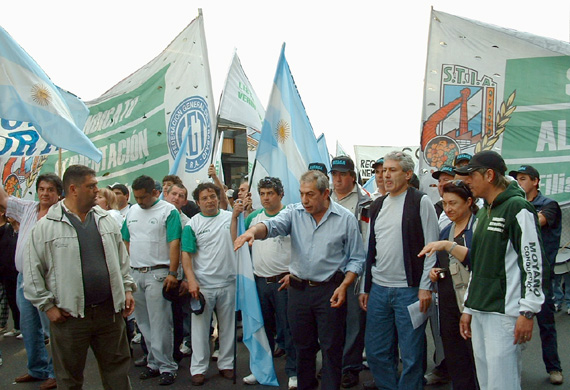The transnational corporation Kraft Foods Argentina
recently laid off 150 workers. After the extensive union
mobilization in Buenos Aires held on 26 August by the
Food Workers Union (STIA) and supportive unions, the
company finally agreed to comply with the legal
framework and agreed to the "compulsory arbitration”
decreed by the Ministry of Labor. Sirel dialogued with
Rodolfo Daer, General Secretary of STIA, who reported
the present status of this conflict.
-What has happened since the union action of 26 August?
-Firstly, STIA held a Plenary Session with 84
Kraft shop-stewards from all over the country. In
that session our first words were to express our
acknowledgment to the IUF solidarity in this
dispute.
There was a very rich discussion, both in terms of firm
convictions on solidarity and also in terms of
methodology for conflict development. In this sense
emphasis was placed in the fact that unions need to be
within legal limits and, in this case, the compulsory
arbitration period for unions provides that no
industrial action can be implemented during such period
and that the company must suspend the decisions that led
to conflict and must abstain from taking new decisions
in that sense.
During the first days we struggled for the company to
abide by these terms, to stop the lock out and to allow
the laid off workers to enter the plant. After
mobilization, and also after the international
projection of this conflict through the IUF,
Kraft Argentina allowed dismissed workers to enter
the plant, although they were not allowed to take their
positions in order to attend supposed training sessions.
-What was the result of the Plenary session?
-There were two motions: one of them proposed a national
24-hour strike and the preparation of a plan of
struggle; while the other one was to approve the actions
taken by the Union Council and empower the Council to
take action conducive to the reinstatement of laid off
workers, abiding by the legal framework in force. The
latter motion was approved by a wide majority.
Unfortunately, the Internal Commission of the plant in
conflict decided against the Shop Steward Plenary, they
resolved to encourage a breach of the compulsory
arbitration and took partial industrial action in the
production process.
-Did the plant finally go on strike?
-Yes, unilaterally, the Internal Commission implemented
a 24-hour strike. The Ministry of Labor sent inspectors
who verified the violation of the compulsory arbitration
conditions. In our opinion, this childish attitude of
the Internal Commission is playing the game of Kraft
management who tramples on the laws of our country
-What are the prospects, then?
-We will go to the factory to meet with workers of both
shifts and make clear that we reject unilateral action
beyond the legal framework because all records show that
these type of law infringement always leads to a
negative outcome for organized workers.
